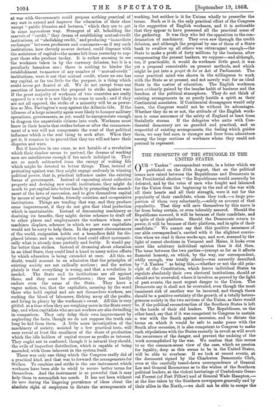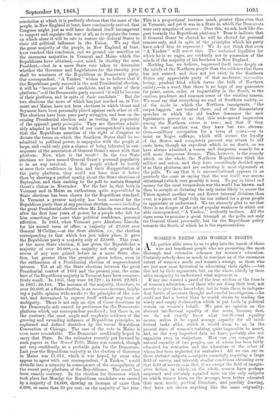THE PROSPECTS OF THE STRUGGLE IN THE UNITED STATES.
OUR " Yankee " correspondent wrote, in a letter which we- published on the 29th August, that on the political issues now raised between the Republicans and Democrats in the Presidential election "the Republicans would assuredly be defeated, and by the votes of men who fought and laboured for the Union from the beginning to the end of the war with all their hearts and all their strength, were it not for the popularity of their candidate, whom they took,—a large pro- portion of them very reluctantly,—solely on account of that popularity. That they will save themselves by this move is far from being certain, or even tolerably assured. Should the Republicans succeed, it will be because of their candidate, and in spite of their platform. Should the Democrats return to power, it will be because of their platform, and in spite of their candidate." We cannot say that this positive assurance of our able correspondent's, carried with it the slightest convic- tion when we read it three weeks ago, and now, scanned by the light of recent elections in Vermont and Maine, it looks even more like arbitrary individual opinion than it did then. The issue between the two parties---(except so far as it affects financial honesty, on which, by the way, our correspondent, oddly enough, was totally silent)—was correctly described by "A Yankee" as being this,—whether or not the old prin-- ciple of the Constitution, which leaves individual States to. regulate absolutely their own electoral institutions, should or should not be overruled, where it involves, as proved by the light of past events, the most urgent danger to the Union. Thern Democrats say it shall not be overruled, even though the most imminent risk of another war be incurred, and though there should be a positive certainty of the growth of a totally hetero- geneous society in the two sections of the Union, as there would be, if the political reconstruction of the Southern States is left in the hands of their old leaders. The Republicans, on the- other hand, say that if it was competent to Congress to sustain a war with the South against secession, and to dictate the- terms on which it would be safe to make peace with the South after secession, it is also competent to Congress to make. such stipulations with the States recently in revolt as will avert. the recurrence of the danger, and prevent the undoing of the work accomplished by the war. We confess that this seems to us the common-sense view of the case, which no passion for legality, deep as this seems to be in the United States, will be able to overbear. If we look at recent events, at the document signed by the Charleston Democratic Club,. even at the carefully toned-down correspondence of General Lee and General Rosencranz as to the wishes of the Southern political leaders, at the violent hectorings of Confederate Gene- ral Forrest (of Fort Pillow) and of General Wade Hampton,— at the line taken by the Southern newspapers generally and by their allies in the North,—we shall not be able to escape the conviction at which it is perfectly obvious that the mass of the people, in New England at least, have conclusively arrived, that Congress might just as well have declared itself incompetent to support and regulate the war at all, as to regulate the terms on which alone it will be safe to restore the disloyal States to their old political influence in the Union. We say that the great majority of the people, in New England at least, have reached this conclusion, and we ground our assertion on the enormous majorities in Vermont and Maine which the Republicans have obtained,—not, mind, in electing the next President,—but in a mere State vote taken to determine whether the Governor and Legislatures for the ensuing year shall be nominees of the Republican or Democratic party. Our correspondent, "A Yankee," wishes us to believe that if the Republican party succeed in the next Presidential election, it will be "because of their candidate, and in spite of their platform ;"—if the Democratic party succeed "it will be because of their platform, and in spite of their candidate." But the two elections the news of which has just reached us, in Ver- mont and Maine, have not been elections in which Grant and Seymour have been personally pitted against each other at all. The elections have been pure party struggles, and bear on the coming Presidential election only as testing the popularity of the opposed party/mine:Pies. They are therefore admir- ably adapted to test the truth of our correspondent's opinion that the Republican assertion of the right of Congress to dictate the terms on which the Southern States shall be re- admitted to political power, is unpopular with the people at large, and could only gain a chance of being tolerated in con- sequence of the association of General Grant's name with that platform. Now, what is this result ? In the two State elections we have named General Grant's personal popularity is in no way involved. If the people wished to testify at once their confidence in him and their disapprobation of the party platform, they could not have done it better than by showing a perfect apathy about tho State elections of September, and then rushing to the poll to sustain General Grant's claims in November. Yet the fact is, that both in Vermont and in Maine an enthusiasm quite unparalleled in State elections has been shown for the Republican standard. In Vermont a greater majority has been secured for the Republican party than at any previous election,—even including the great Presidential election when Mr. Lincoln was returned, after his first four years of power, by a people who felt for him something far more than political confidence, personal affection. In 1864, when Vermont gave Abraham Lincoln, for his second term of office, a majority of 29,000 over General M'Clellan,—at the State election, i.e., the election corresponding to that which has just taken place, it gave the Republican party a majority only of 22,000. This year, at the mere State election, it has given the Republicins a majority of over 30,000,—a majority not only greatly in excess of any ever gained before in a mere State elec- tion, but greater than the greatest given before, even in the enthusiasm of a Presidential election of unprecedented interest. Yet at all the State elections between the great Presidential contest of 1864 and the present year, the num- bers of the Republican majority in Vermont have been compara- tively small. In 1865, they were 18,729; in 1866, 22,825; in 1867, 20,184. The increase of the majority, therefore, to over 30,000, at a State election, is an enormous increase, imply- ing a public opinion wide-awake to the principles of the con- test, and determined to express itself without any trace of ambiguity. There is not only no sign of those desertions to the Democratic side caused by preference for the Democratic platform which our correspondent predicted ; but there is, on the contrary, the most ample and emphatic evidence of the growing and extending influence of Republican principles, as explained and defined doubtless by the recent Republican Convention at Chicago. The case of the vote in Maine is even more remarkable. The Democrats confidently hoped to carry that State. In the estimates recently put forward by such papers as the Round Table, Maine was counted, though not very confidently, as a probable gain for the Democrats. Last year the Republican majority at the election of Governor in Maine was 11,614, which it was hoped, by some who appear to agree with our correspondent, "A Yankee," would dwindle into a minority in consequence of the unpopularity of the recent party platform of the Republicans. The result has been exactly contrary. In the election for Governor which took place last Monday the Republican candidate was carried by a majority of 18,000, showing an increase of more than 6,00% or more than 50 per cent, on the majority of last year.
This is a proportional increase much greater than even that in Vermont, and yet it was in a State in which the Democrats were very sanguine of success. Does this, we ask, look like dis- gust towards the Republican platform ? Does it indicate that if General Grant be elected he will be elected for personal reasons only, and in spite of the principles which his party have asked him to represent ? We do not think that even "A Yankee" will assert this. The technical legalities for which he is so eager, are evidently not in possession of the minds of the majority of his brethren in New England.
Nothing has, we believe, impressed itself more deeply on the minds of the Northern people than the evidence that there has not existed, and does not yet exist, in the Southern States any appreciable party of that moderate, ria-media- loving, prudent kind which forms the bulk of Northern society,—in a word, that there is no hope of any guarantee for peace, union, order, or impartiality in the South, in the caution, prudence, and common sense of the existing masses. We must say that everything we read of Southern society,— of the mode in which the Northern immigrants, "the carpet-baggers," are treated there, and of the denunciatory speeches in which the old leaders denounce the new legislatures, proves to us that this wide-spread impression among the Northern, voters is true ; and that if they do not want another war, they have but two alterna- tives,—military occupation for a term of years,—or to insist on Negro suffrage, which will secure the loyalty of the States, and completely prevent any return to old caste laws, though an expedient which is, no doubt, as we have always admitted, a coarse and dangerous remedy for a still more dangerous disease. This, however, is the remedy which, on the whole, the Northern Republicans think the mildest and safest, and they have accordingly decided upon it as their platform, and are endorsing it most vigorously at the polls. To say that it is unconstitutional appears to us precisely the same as saying that the war itself was uncon- stitutional (which very possibly it was). To pay in blood and money for the most tremendous war the world has known, and then to scruple at dictating the only terms likely to secure the Union against another war and fiercer internal divisions than ever, is a piece of legal folly far too refined for a great people to appreciate or understand. We are sincerely glad to see that there is no danger of the act of popular weakness to which our able correspondent, "A Yankee," evidently inclines. All the signs seem to promise a great triumph at the polls, not only for General Grant personally, but for the Republican policy towards the South of which he is the representative.































 Previous page
Previous page